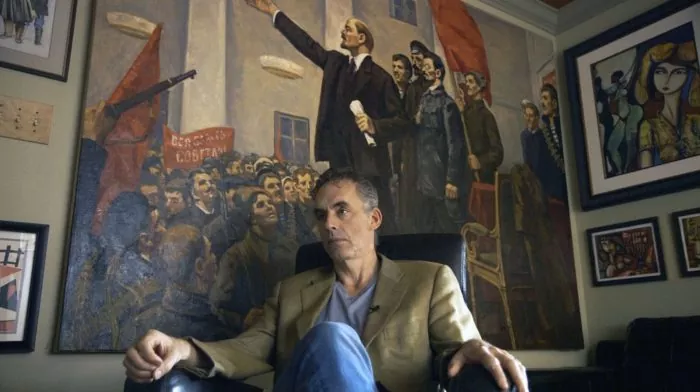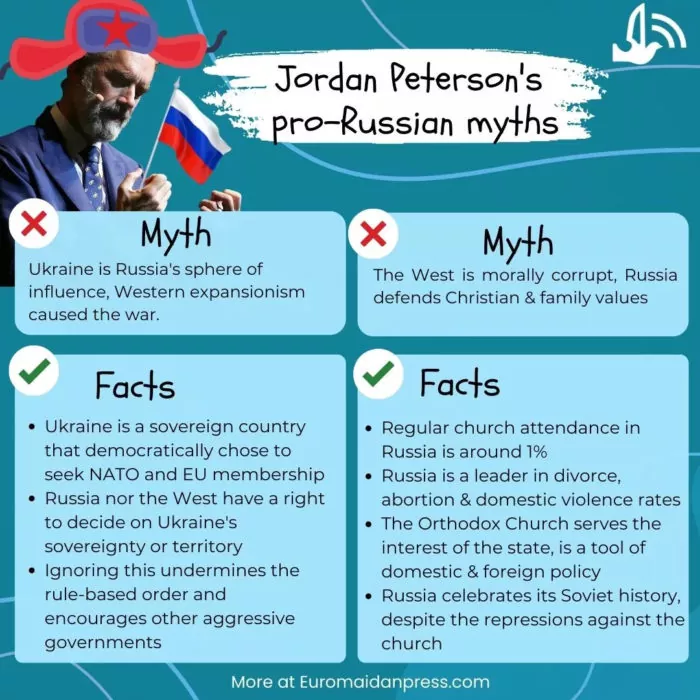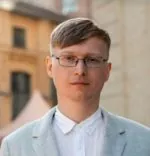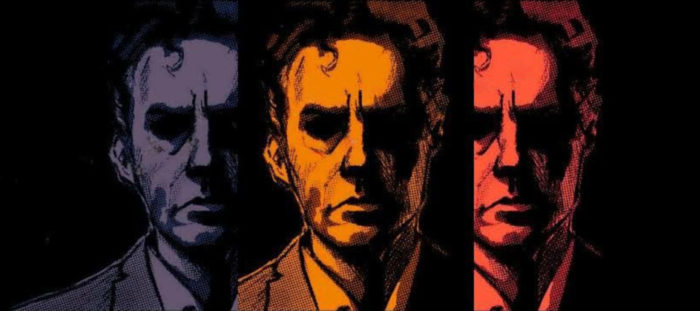Jordan Peterson is a Canadian psychologist and public intellectual widely known for his classic liberal stance in the “culture war” debates. While speaking out against far-left political and cultural trends in the West, Peterson emphasizes the value of individual freedom and exposes totalitarian thinking of political extremes. He has expressed some ethical views in 12 Rules for Life and Beyond Order. The books have become widely popular and sold millions of copies worldwide, including in Ukraine.
After Russia started its full-scale invasion of Ukraine, Peterson made several statements on the ongoing war, presenting the quintessence of his points in the Russia Vs. Ukraine Or Civil War In The West YouTube video. The video sparked a highly critical reaction among Ukrainians familiar with Peterson’s books and public activity; they noted the stark contradiction between Peterson’s previously declared liberal views and nothing short of the justification for the Russian invasion of Ukraine.
Peterson’s reflection on the war turned out to be a stream of Kremlin propaganda narratives, fake data, speculative statements, and lengthy deliberations — coming close to expressing admiration — about Putin’s personality. In his speech, Peterson blamed NATO, the EU, Ukraine, and the Western leftists for Russia’s invasion of Ukraine.
The ongoing war was presented as a clash between Russia and the West, while a 44-million Ukrainian nation was mentioned purely as an object whose agency manifested only once—when it gave Russia a reason for the invasion. At the same time, Peterson did not even raise the question of Russia’s responsibility for the war.
Fundamental theses of Peterson’s speech are common among many Western apologists for the Russian war of aggression against Ukraine. They reproduce key messages of the Kremlin’s propaganda machine aimed at legitimizing its war of conquest in the eyes of Western audiences. This article examines the Kremlin propaganda narratives amplified by Peterson and provides factual and conceptual background to show why they are wrong.
Narrative #1. NATO and the EU have provoked the Russian invasion by expanding into Ukraine
Peterson puts responsibility for the ongoing Russian war of conquest against Ukraine on NATO and the EU.
As he claims, one of the reasons for this war is that Russia has been “threatened by careless and provocative Western expansionism into a country we really don’t care about (…) which is a key to Russian identity and security.”
5 reasons why Russia’s war is to conquer Ukraine, not defend itself from NATO
Peterson, citing another Russia apologist, John Mearsheimer, attributes Ukraine to the “Russian sphere of influence,” ignoring the fact that Ukraine is a sovereign, independent 44-million nation.
By doing so, Peterson backs up the propaganda narrative exploited by top Russian officials, including Putin, and chief propagandists to justify Russia’s war of genocide in the eyes of Western audiences, especially those leaning to the far-left and the far-right. However, Peterson’s adherence to this narrative is based on a total lack of expertise on Ukraine, Russia, and the situation on the ground:
1. Choosing an alliance is a sovereign right of Ukraine, which is not a matter of discussion, negotiation, or compromise. The same is true for the other 14 European countries that have joined NATO since 1997 but are still considered part of “Russia’s sphere of influence” by the Kremlin. The principle of sovereignty and commitment to international law is the fundamental ethical framework for anyone associating himself with liberalism and democracy. Jordan Peterson, famous for advocating “classical liberalism” and commitment to Western values, falls into contradiction when he declares support for the expansionist narrative of a dictatorial regime that reduces half of Europe to Russia’s “sphere of influence.”
2. Russia’s war against Ukraine does not respond to Ukraine’s intention to join NATO. It is because of Russia’s invasion that Ukraine has been seeking to join NATO for the last eight years.
Ukraine was a neutral state when Russia attacked it in 2014. Only after Russia occupied Crimea and a part of Donbas did Ukraine abandon its non-aligned status and declare joining NATO as its strategic goal. It is also due to Russian aggression that public support for joining NATO among Ukrainians rose to 44% by the end of 2014 (compared to 13% in 2012). It went up to 62% amidst Russia’s military buildup in February 2022 and was estimated at 86% as of January 2023.
It is self-contradictory to believe that “NATO’s expansionism” prompted Russia to occupy Crimea and a part of Donbas in 2014, when Ukraine was an officially non-aligned state, with only 13% of Ukrainians supporting NATO membership. For the last eight years, Russia has proved to be the most effective promoter of “NATO expansion” in Ukraine, as it previously did in other Eastern and Central European countries.
3. Acknowledging the “Russian sphere of interest” would mean betraying NATO allies in Central and Eastern Europe. At the end of 2021, Russia demanded NATO remove military infrastructure from its 14 member states, which, as the Kremlin imagines, belong to the “Russian sphere of influence.” Should NATO yield to this demand and break the trust of its allies? Compromising with the Kremlin’s fantasies about the “Russian sphere of influence” will only doom the West to an endless circle of humiliating concessions.
4. NATO is not a “threat” to Russia since it has no legal or political mechanisms to initiate an attack on Russia. Moreover, it is not likely that the leadership of any state would seriously consider invading a nuclear superpower. The Kremlin has always understood this and effectively exploited those who preferred their theoretical exercises over reality.
5. For Russia, NATO has always been an “obstacle,” not a “threat.” Russia’s top officials and chief propagandists have constantly declared their intention to “de-Nazify” Poland, Estonia, Latvia, Lithuania, Moldova, Kazakhstan, and other countries that the Kremlin imagines as part of “Russia’s sphere of influence.” The fact that some of these countries are now members of NATO is a factor that limits Russia’s expansionism.
It is not NATO that is a “threat” to Russia. Still, Russia itself is a real threat to its neighbors, which is why almost all countries of the former Eastern Bloc, Finland, and Sweden, decided to join NATO as soon as they gained such an opportunity.
6. Russia uses the narrative of “NATO expansionism” to distract the attention of Western audiences from the genocidal nature of its war against Ukraine. The remarkable trait of the current war is that Russia’s top officials and chief propagandists are not trying to conceal its genocidal character, openly calling to annihilate the Ukrainian nation.
Russia’s genocidal rhetoric is in complete agreement with their actions: Russians have already killed tens of thousands of Ukrainian civilians; the Russian military has razed entire cities to the ground; up to 1.6 million Ukrainians were deported to Russia; many Ukrainian children have been forcefully adopted by Russian families; Russian soldiers raped Ukrainian women and children en masse; Russia has annexed 27% of Ukrainian territory; and it has been eradicating Ukrainian culture and language in the occupied regions. How is all of that supposed to counter “NATO expansionism”?
Narrative #2. The Russian invasion of Ukraine is a response to Ukraine’s oppression of Russian-speaking Ukrainians
In his speech, Peterson depicts Ukraine as a hugely divided nation with an inner conflict between “Ukrainian speakers” and “Russian speakers.”
To corroborate his thesis, Peterson refers to his interpretation of the Ukrainian presidential campaigns of 2010 and 2019:
“The Ukraine president Yanukovych, deposed in 2014 in the aftermath of widespread pro-EU protest, was the clear favorite and choice of the Russian speaking Ukrainians who overwhelmingly occupied the south-eastern section of the county. While Zelensky, the current president and supporter of all things Western, was and is supported by the Ukrainian speakers who live in the North-East. The Ukrainian-speaking supported government has placed increasingly draconian restrictions of the Russian-speakers on the North-West.“
According to Peterson, the notion above gave Putin and the Russians “their reasons for concern over the situation in Ukraine,” which mirrors the Russian propaganda narrative about the “oppression of Russian speakers,” whom Russia is “liberating.”
However, Peterson’s attempt to oppose “Ukrainian-speaking Ukrainians” to “Russian-speaking Ukrainians” is largely based on non-existent data and groundless speculation. The problem with Peterson’s views is the following:
1. Peterson refers to imaginary electoral data about the presidential campaign of 2019, claiming that Zelenskyy was the choice of only “Ukrainian speakers” in the “Northeast.” In reality, 73% of Ukrainians supported Zelenskyy. He gained the majority of votes in all oblasts of Ukraine, except for the Lviv Oblast in the west.
What Peterson labels “North-East” or “North-West” is baffling since these notions, presented by Peterson as somehow related to the imaginary political opposition between “Russian speakers” and “Ukrainian speakers,” do not have any meaning in Ukraine’s linguistic or cultural landscape. As of now, 91% of Ukrainians approve of Zelenskyy’s performance. So, if an electoral map can be treated as a credible tool to reveal a “conflict” in a society, it clearly shows the unity of Ukrainians instead.
2. Peterson uses data from the presidential election held 13 years ago to create the impression that “Ukrainian speakers” are pro-Western and “Russian speakers” are pro-Russian. This is not the case. The fact that Viktor Yanukovych, favored by Russia, gained huge support in the east and south of Ukraine in 2010 does not mean that Ukrainians wanted to be invaded by Russia. Moreover, one of the key points of the presidential program of Viktor Yanukovych in 2010 was his support for the European integration of Ukraine, which makes Peterson’s assumption meaningless.
Putin’s Big Lie: the “Donbas genocide” and “impending Ukrainian attack”
3. Peterson introduces the false idea of a political conflict between “Ukrainian speakers” and “Russian speakers” in the preceding statements. For most Ukrainians, this would sound like nonsense, similar to making a political division between “blue-eyed Ukrainians” and “green-eyed Ukrainians” or between “Ukrainian engineers” and “Ukrainian philologists.” All Ukrainians understand Ukrainian and Russian perfectly well; many Ukrainians are bilingual, meaning they use either Ukrainian or Russian, depending on the context. Some prefer only Ukrainian or Russian, while others speak surzhyk, a chaotic combination of both Ukrainian and Russian.
However, all these language experiences do not constitute distinct political and cultural identities since Ukrainian national identity is not strictly dependent on a language. Speaking Russian does not make one pro-Russian, just like speaking English in the US does not make one a sympathizer of the British Empire, or speaking Portuguese in Brazil does not make one willing to cede independence to Portugal.
4. Peterson’s attempt to link the Russian invasion to the fact that many Ukrainians speak Russian is an insult to all those Ukrainians killed by Russia during this war. The Russian aggression has brought the most suffering and destruction to the southern and eastern oblasts, where Ukrainians mostly speak Russian. Russians have killed more than 25,000 Ukrainians in Mariupol alone. Entire cities, like Mariupol, Sievierodonetsk, Bakhmut, and others, have been razed to the ground. In the eastern Ukrainian cities of Lyman and Izium, which were under Russian occupation, mass graves with the bodies of hundreds of Ukrainians have been found, many showing signs of torture and execution. In light of the mass extermination of Ukrainians, Peterson’s assertion that Putin and the Russians had “their reasons for concern over the [language] situation in Ukraine” is just a dishonorable attempt to justify pure evil.
Narrative #3. Russia invaded Ukraine to counter the “degeneracy” of the West
According to Peterson, the Russian invasion of Ukraine is an extension of the “culture war” in the West. As he believes, Russia is driven by the need to fight the “degenerate” leftist trends in the West, to which Russians have a strong aversion due to their traumatic communist past.
Peterson tries to show how Russians see the West falling into neo-Marxist ideology:
“Those Westerners are so out of their mind, possessed by the very ideas that destroyed us for a century, that we simply cannot trust them. Those Westerners are so out of their mind that a devastated but neutral Ukraine is preferable to a functional bordering state aligned with the US and Europe. Those Westerners are so out of their mind, that we will push the world to the brink of a nuclear war and potentially beyond to keep them off our doorstep because we’ve been there before and we’re not going back.“
Contrary to the “decadent” West, as Peterson argues, Russia is a bulwark of Christendom, showing “every sign of the revival of Christianity.” To reinforce this idea, Peterson refers to the works of Fyodor Dostoyevsky and Alexander Solzhenitsyn. The latter is revered in the West as a writer of the “The Gulag Archipelago” but known in Ukraine as a Russian chauvinist who called to annex parts of Ukraine, Belarus, and Kazakhstan to restore the Russian Empire.
However, Peterson’s ideas regarding the Russians’ attitude towards their communist past and Christianity are a far cry from reality:
1. Russians see their communist past in the opposite way Peterson does. According to the Russian independent polling organization Levada Center, 65% of Russians regret the collapse of the Soviet Union, 75% approve of Soviet dictator Joseph Stalin’s rule, and 45% believe that the human losses caused by Stalin’s terror policy are justified.
These losses included 4 million Ukrainians, who died of starvation in an artificial famine, known as Holodomor in 1932–1933, and 34,000–110,000 Crimean Tatars (18–46% of their total population), who fell victim to genocide in 1944, among countless other victims across the entire Soviet Union.

The popular nostalgia for the communist past goes hand in hand with Putin’s lamentations about the collapse of the Soviet Union as “the greatest geopolitical catastrophe of the 20th century,” moaning about the Ukrainian decommunization campaign, and praising Stalin as an “effective manager.”
The remarkable manifestation of the overall Soviet nostalgia is that Russian forces in the occupied territories of Ukraine reinstall monuments to the communist dictator Lenin and rename city toponyms to honor bolshevik leaders, the October Revolution, the Komsomol, and so on. Thus, Russians are not fighting against Ukraine to stop the spread of the “ideas that destroyed them for a century,” as Peterson suggests. Instead, the Kremlin is trying to drag Ukraine back to the Soviet past that chained Russia’s political system and doomed it to reproduce the same mistakes with the same consequences
Russian propaganda now shows Ukraine as “enslaved brother,” invasion as “just reclamation”
2. Whereas Peterson celebrates Russia’s anti-left stance, the Kremlin actively supports and exploits far-left political groups in the West to advance its geopolitical agenda. There are reports that Russia has links to the far-left parties Die Linke, Syriza, The Party of the European Left, and the European United Left/Nordic Green Left. Since February 2022, the leftists’ justification for Russia’s war of aggression has become a common practice. Moreover, Russia is an ally of the communist totalitarian regimes of China and North Korea and a close partner of Cuba and Venezuela, which should have triggered some worries for Peterson, a vocal supporter of “classical liberalism.” Thus, there is no reason to believe that Russia practically opposes the left in the “culture war.” Russia and the Western left instead enjoy a symbiotic relationship.
3. Contrary to Peterson’s belief, Russia is not a bulwark of Christianity. In fact, only 9% of Russians attend church at least once per month. In comparison, monthly church attendance is estimated at 21% in Ukraine and 42% in the US. Thus, Russia has no real ground to present itself as a force with a unique pro-Christian stance in the “culture war.” It is especially given that Russian state-owned media sees no problem wishing European families for Christmas to starve to the point where their children will eat their beloved pets out of hunger.
Narrative #4. The West should concede to Russia’s nuclear blackmail to avoid nuclear war
Peterson believes the West should make a peace deal with Russia as soon as possible. He argues that nuclear war is the alternative to “peace” in Russian terms. Since Russians “will not allow themselves to lose,” the West should take, what Peterson believes to be, the Kremlin’s interests seriously:
“If our G7 leaders had one iota of sense, in my opinion, they would be focusing with single-minded intensity on determining exactly what the Russians would accept as a minimum precondition for peace. Perhaps, the declaration of Ukraine as a neutral state for a minimum period of 20 years? Perhaps, a new election in Ukraine subject to ratification by joint Russian-Western observers? Perhaps, a pledge on the part of the West to not offer to Ukraine any membership in NATO or the EU that is either not simultaneously offered to Russia or moving forward on terms acceptable to Russia.”
Russian propaganda escalates, laying ground for nuclear strike
Notably, while discussing the forms of subjugating Ukraine to the Kremlin’s will, Peterson does not consider the sovereignty of the Ukrainian nation as something one needs to take into account or even mention.
Peterson de facto urges the West to force Ukraine to make concessions to Russia “not to humiliate Putin” and thus to avoid nuclear war. However, such a “peacemaking” approach is not only dangerous for Ukraine but also destructive for the West for several reasons:
1. Making concessions to Russia’s nuclear blackmail will lead to an endless circle of humiliating concessions. Western intellectuals and politicians who advocate for forcing Ukraine to cede its territories to “save Putin’s face” did not draw conclusions from their experience.
The West has a long story of appeasing Russia’s dictator. It ignored or did not respond adequately to:
- Russia’s violation of the territorial integrity of Moldova (1990-1992) and Georgia (1991-1993);
- Russia’s genocide of the Chechen people during the Russia-Chechen wars (1994-1996, 1999-2009);
- Russia’s invasion of Georgia (2008);
- Russia’s war against Ukraine in Donbas and Crimea (2014-2022);
- the Russian campaign of atrocities against civilians during its intervention in Syria (ongoing since 2015).
Russia’s full-scale invasion of Ukraine is just the result of the long-lasting pattern of Russia’s imperialism, emboldened by the long-lasting pattern of “face-saving” Western policies.
Any concession Ukraine makes to Russia will only fuel Russia’s imperialism. It will also demonstrate the effectiveness of nuclear blackmail tactics. Given that Russia’s state-owned propaganda openly discusses Russia’s intentions to invade NATO member states, Western leaders and intellectuals should take this idea as seriously as possible — rewarding Russia’s nuclear threats will turn international politics into endless concessions to Russia and other nuclear powers.
2. Making concessions to Russia’s nuclear blackmail will destroy the nuclear non-proliferation system. Ukraine gave up the third largest nuclear arsenal in the world in exchange for security assurances from the US, the UK, and Russia, according to the Budapest Memorandum signed in 1994. Now, Russia, the nuclear power that formally provided Ukraine with security assurances in exchange for its nuclear arsenal, is invading and threatening to use nuclear weapons against Ukraine – the country that willingly gave up its nuclear arsenal

If Russia’s war of aggression is rewarded, this will prove that the non-proliferation system does not work. As a result, many countries will abandon their non-proliferation policy and seek to acquire nuclear weapons to deter major nuclear powers. It will put an end to the non-proliferation system that has been in place for half a century and usher in a new era of nuclear challenges for which the West is not prepared.
3. Making concessions to Russia’s nuclear blackmail will undermine international law and the post-WWII security architecture. Respect for sovereignty and territorial integrity are fundamental principles of the UN Charter. If the world allows Russia to violate those principles, this will bring the world back to the times of imperial conquest. Reviving the “might is right” principle will embolden Russia and other totalitarian regimes allied with Russia to pursue their territorial ambitions with impunity.
4. Peterson’s suggestion that Ukraine holds a “new election subject to ratification by joint Russian-Western observers” disregards the will of the Ukrainian people. The Constitution of Ukraine is the only source that defines conditions for presidential and parliamentary elections in Ukraine, and it does not contain conditions such as “we should not humiliate Putin” or “let’s not corner the explosive bear.“ Peterson’s call to violate Ukrainian laws and involve Russian “observers” to legitimize this violation defies common sense and the concept of dignity, let alone anything resembling “classical liberalism.”
Conclusion
Russia’s war of aggression against Ukraine is Europe’s largest and bloodiest war since World War II. It reproduces many patterns of that war about which we have become accustomed to saying “Never again.” Russia is determined to eradicate the Ukrainian nation, annex Ukraine’s territories, and erase its language and culture. And after that, go after other countries waiting in line for what the Russians call “de-Nazification,” but what the rest of the world refers to as genocide.
This war is not only a test for Ukraine but also an ethical and political challenge for the West. In his speeches, Peterson often questions whether we have learned the lessons of World War II and how we would act if we had lived then. Since 24 February 2022, we have responded to this question through our actions and speeches.
 Taras Fostiak is a Business Analyst in the IT industry.
Taras Fostiak is a Business Analyst in the IT industry.
Related:
- Russian propaganda in war: fake “fact-checkers,” far-right conspiracies, and distracted progressives
- Psycho viruses and information dumps: how Russian propaganda breaks will to resist in the Ukraine war
- Russian propaganda is a war tool and must be ostracized – military expert
- Putin has started “solving the Ukrainian question”
- How the Russian Orthodox Church enabled Putin’s war against Ukraine




